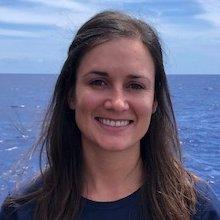
Sarah Bremmer
Tell us about your work/research. What kinds of things do you do?
I’m interested in the physical processes of geologic hazards and the impact they have on society, particularly, active fault and earthquake hazards. My M.S. research focused on the spatial and temporal evolution of an accretionary wedge and active plate boundary fault off the coast of Japan. I used 3D seismic reflection data to interpret the structural geology of large-scale faults in the shallow portion of the subduction zone and understand how they developed and changed over geologic time.
What sparked your initial interest in your career?
I fell in love with geoscience when I took my first geology course as an undergrad. I became (and still am) fascinated with Earth’s natural systems and processes, and the way geoscientists are able to tell so much about our planet’s past, present, and future by “reading the rocks.” I continued on to a B.S. in geoscience, then an M.S. in geoscience, and have never looked back. Despite most of my education and professional experience, thus far, being in the geosciences, I have always been intrigued by ocean science and am particularly interested in where the two disciplines meet. I am continually amazed by how complex, intricate, and interconnected Earth’s systems are and I’m excited about how much there is to learn and discover.
Who influenced you or encouraged you the most?
Although I am lucky to have had many great mentors, my undergrad and grad-school advisors were particularly supportive and influential. They believed in my success, taught me to believe in myself, and encouraged me to follow my dreams and continue pursuing a career in geology.
What element of your work/study do you think is the most fascinating?
This is a tough question for me because I find many aspects of my work fascinating, but what really gets me excited and reminds me why I chose this career is getting to see the things I’ve learned about and studied in real life – in the real world. I love being out in the field. Text books help you learn the terminology and concepts, but to apply what you’ve learned and put it into context, I think it’s extremely important to get your hands dirty.
What other jobs led you to your current career?
Hydrologic Technician for the US Geological Survey Water Science Center in Flagstaff, AZ
Research Assistant and Geochemical Lab Technician for the Wisconsin Geological & Natural History Survey
Geoscience Intern at Hess Corporation
Associate Lecturer at UW-Milwaukee and University of St. Thomas
Geology Tutor at UW-Madison
Instructor for geology field camp in Morocco
What are your degrees and certifications?
B. S. in Geoscience, Northern Arizona University (2012)
M.S. in Geoscience, University of Wisconsin-Madison (2018)
What are your hobbies?
Mineral hunting, camping, kayaking, swimming, water skiing, exploring!
How did you get involved with the Nautilus Exploration Program?
I first became familiar with the OET and Nautilus Exploration Program while teaching Oceanography at UW-Milwaukee. The E/V Nautilus was mapping the submerged shorelines in the southern California Borderlands at the time I was teaching about seafloor bathymetry. The class got to participate in the Nautilus Live interactive website and ask the science team questions during one of my lectures. This was really exciting for the students, and for me, and spurred my interest in Ocean Exploration Trust and the Science & Engineering Internship Program. I wanted to get involved in the ocean science that I’d been teaching about, so I applied to sail.
What advice would you give someone who wants to have a career like yours?
Be open to, and grab, the opportunities that are available – be proactive about finding these opportunities, they most likely won’t just fall into your lap. Don’t sell yourself short and assume you’re unqualified. Ask lots of questions – take ownership of your education. Become very comfortable and accepting of constructive criticism from your mentors – and ask for it. Stay curious and stay passionate.
Expeditions
Sarah participated in the following Ocean Exploration Trust expeditions:
